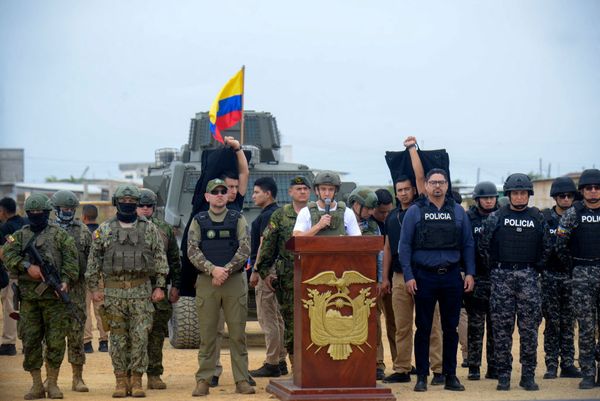The question of how we defend our way of life has once again become urgent.
From the beaches of Normandy to the front lines in Ukraine, history reminds us that peace is never guaranteed, and defence never comes without cost.
In The Independent’s new expert-led discussion series, The Conversation, we launched with Shifting Alliances, a panel I chaired as world affairs editor.
I was joined by Sir Alex Younger, former MI6 chief, and Dr Rachel Ellehuus, director-general of the Royal United Services Institute and former Pentagon official.
Together, we examined the shifting landscape of global security, the consequences of decades of military retrenchment, and what a future without the American security umbrella might mean for Europe.
During the discussion, Sir Alex warned that the collapse of the Soviet Union led to complacency and chronic underinvestment in European defence, leaving the West dangerously exposed.
Now, as the US reconsiders its strategic priorities and figures like Donald Trump and Vladimir Putin exploit instability, Europe must confront hard questions: What are we willing to sacrifice for security? What does deterrence really require?
Should national service return in some form? Can peace be preserved without the credible threat of overwhelming force? Is support for Russia a betrayal – and is selling off critical infrastructure to China an act of economic treason?
In the Q&A below, I respond to audience questions on defence, duty, national service, and the meaning of loyalty in an increasingly uncertain world.
Q: Does anyone really think Russia is planning to attack the UK? What would it have to gain?
HuggyBear
A: Not the UK, ultimately, but other parts of Europe quite possibly.
The Kremlin sees the West as a perpetual threat. There is nothing more damaging to a dictatorship than evidence of happier, more prosperous, free nations on the other side of the border fence.
That’s why Putin wants endless instability in the West. He must be delighted by what’s unfolding in Washington and the disastrous mess of tariffs, etc.
Q: What do young men fight for in any war?
StaceyBenoit
A: It’s tough for many, but a hell of a lot worse would follow if we do nothing to protect it all. And life in 1914 and 1939 was a LOT harder, especially for the less wealthy.
Young people need to know that in Ukraine, the average age of soldiers is 43, and the minimum age for conscription is above 25. So far, the young fighters are all volunteers.
But young or old, many are highly motivated. Others have deserted, and many buy their way out of military service – but that is getting harder. In the end, if people don’t believe their way of life is worth defending, it won’t survive.
Q: How could Russia conquer Europe with a smaller economy, rearmed Germany, and neo-Nazi opposition?
AlbionMan
A: Russia spends at least 8 per cent of its GDP on the military. But crucially, Russia (like China) has a strategic agenda and has made it clear that Eastern Europe is in the Kremlin’s sights. Plus, it has found that non-violent actions, like subverting democracies through disinformation and dismantling the idea of truth itself, are also highly effective.
The purpose of war is to inflict pain to bend the will or change the agenda of the enemy. No pain no gain, literally.
It’s vile, stupid and ugly, but necessary to give the impression that you can inflict overwhelming pain to have deterrence and keep peace. The weakness of the West was exposed in Iraq, where the US-led coalition lost and Afghanistan, where it also lost. It’s not just Russia that clocked this.
Q: Sir Alex Younger says Britain’s fallen behind in defence and questions collective effort. I wonder why this is the case?
PoliticiansLie
A: Fear of taxation. Complacency. Brexit’s disastrous effect on the economy.
Q: Do you think an army gathered by national service is viable now?
DHDeal
A: The idea of national service is inimical to the sort of attitudes boomers like me have had all our lives. But that complacency has left the UK and Europe dangerously weak in the face of adversaries like China and Russia – who are not complacent and have imperial-style plans that may include the West.
Having seen the ravages of war in Ukraine, I am convinced the UK needs to step up with a national effort to invigorate the economy and generate a sense of mission. The young men cut down on Sword Beach and elsewhere lived in a world in which the state did far less for them than we now enjoy.
Q: Should we try to maintain a level of innocence in the UK when it comes to war?
bboulton
A: War is truly terrible. Ukraine has shown how terrible it can be in Europe. But preparing for war may allow for a longer peace.
Some of the questions and answers have been edited for this article. You can read the full discussion in the comments section of the original article.
Tim Pool now says there’s ‘no actual proof’ showing he unwittingly took Russian money
Starmer pledges to slash time needed to set up clinical trials to 150 days
‘Little suns in the classroom’: Ukrainian city mourns children killed by Russian missile
How reduced University fees and home loans could nudge Gen Z into conscription
King Charles and Camilla to begin Italy tour hospital visit: Royals news live
The five changes under Starmer’s relaxed electric vehicle targets







